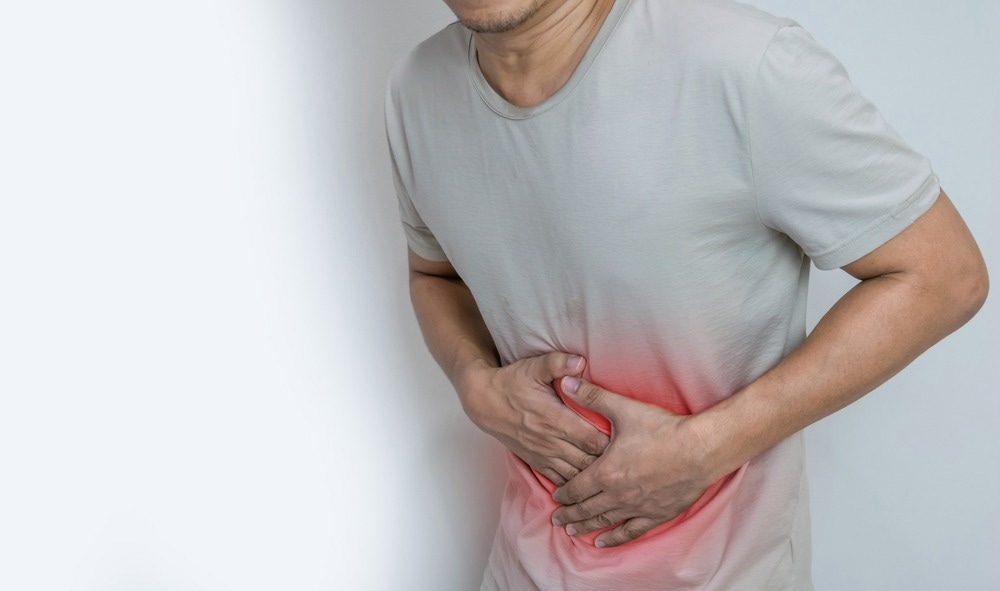In a recent study published in the Indian Journal of Critical Care Medicine, researchers described two cases of acute pain in the abdomen of patients with coronavirus disease 2019 (COVID-19).
 Study: An Unusual Cause of Acute Abdominal Pain in Coronavirus Disease (COVID-19): Report of Two Cases. Image Credit: kung_tom/Shutterstock
Study: An Unusual Cause of Acute Abdominal Pain in Coronavirus Disease (COVID-19): Report of Two Cases. Image Credit: kung_tom/Shutterstock
Background
Severe acute respiratory syndrome coronavirus 2 (SARS-CoV-2) causes COVID-19, which usually results in respiratory symptoms. The disease severity varies from asymptomatic/mild to acute respiratory distress syndrome. Gastrointestinal (GI) symptoms are reported by up to a third of COVID-19 patients. GI complications range from mild transaminitis to severe bowel ischemia. Mesenteric panniculitis (MP) is a rare, chronic, acute inflammation of adipose tissue in the intestinal mesentery. Several factors have been implicated in MP; still, the etiology of MP remains unclear.
The study and findings
In the present study, researchers described MP in two patients with COVID-19. The first patient was a female aged 55 who presented with nausea and upper abdominal pain for four days. The subject tested SARS-CoV-2-positive 10 days before and had mild disease. The patient had asthma for three decades and diabetes for the past two years. The case was afebrile for five days before admission.
On examination, the temperature was 100°F, the pulse oximetric saturation (SpO2) was 96% (breathing room air), blood pressure was 130/80 mm Hg, respiratory rate was 20 breaths per minute, and pulse rate was 114 beats/minute. Examination of the abdomen showed tender umbilical and epigastric areas.
Laboratory investigation showed elevated D-dimer and C-reactive protein (CRP) levels and neutrophilic leukocytosis. Contrast-enhanced computed tomography (CECT) of the abdomen showed smudging of flat planes around superior mesenteric vessels and branches in the root of small bowel mesentery associated with mesenteric lymph nodes, suggesting MP.
The patient was given intravenous (IV) methylprednisolone, fentanyl infusion, fluids, and subcutaneous (SC) enoxaparin. Tenderness and pain subsided after three days. The subject was discharged with oral glucocorticoids tapered over the following four weeks. The second case was a male aged 69 who presented with cough, fever, and dyspnea for the past week.
Examination revealed a pulse rate of 130 beats/minute, normal blood pressure, SpO2 of 86% (breathing room air), and a respiratory rate of 30 breaths/minute. Auscultation revealed bilateral crackles. Chest CT scan showed bilateral diffuse ground-glass opacities concordant with COVID-19 pneumonia, also confirmed by a SARS-CoV-2 reverse-transcription polymerase chain reaction (RT-PCR) test.
IV remdesivir, methylprednisolone, SC enoxaparin, and supportive care were initiated. The patient initially required oxygen supplementation and showed symptomatic improvement. The subject experienced severe epigastric pain on day 7 of hospitalization, with diffused tenderness throughout the abdomen. Laboratory investigations revealed normal serum lipase and amylase levels but elevated CRP. Abdominal CT scan showed fat in the central mesentery, indicative of MP.
High-flow oxygen was started due to worsening hypoxia, and the patient required admission to the intensive care unit. The dose of methylprednisolone was increased; abdominal pain subsided after 48 hours, with a gradual improvement of hypoxia. The patient was discharged with oral glucocorticoids tapered over the following month. After three months, the patient had exertional dyspnea.
Conclusions
In summary, the authors described two cases of MP with abdominal pain during COVID-19 infection. The association between MP and COVID-19 is rare. MP was diagnosed by radiological and clinical examination. Glucocorticoid treatment led to the complete resolution of abdominal pain without recurrence at three months of follow-up.